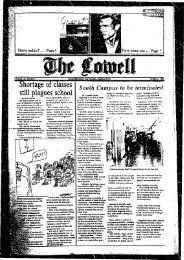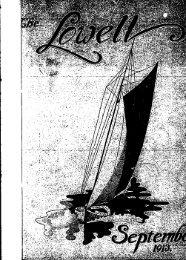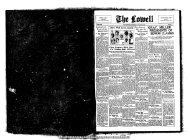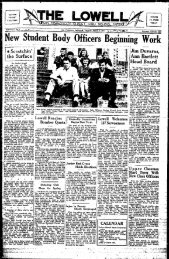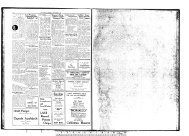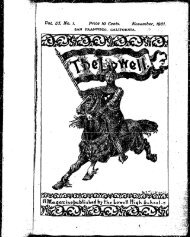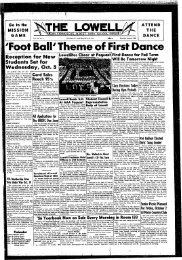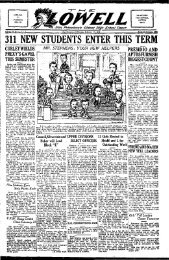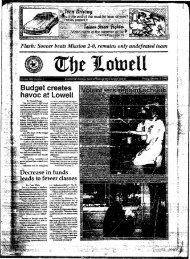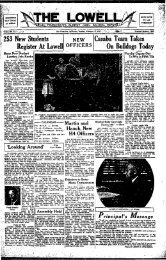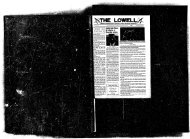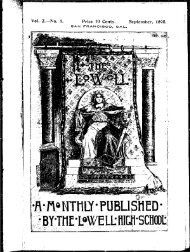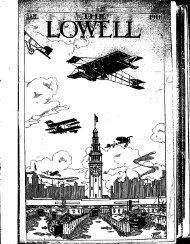Severely handicapped class arrives - The Lowell
Severely handicapped class arrives - The Lowell
Severely handicapped class arrives - The Lowell
Create successful ePaper yourself
Turn your PDF publications into a flip-book with our unique Google optimized e-Paper software.
hr UMM. OrmcVr 4, i<br />
POLITICS.<br />
US on trial Hope looms at coming arms talks<br />
at World Court<br />
Dy Steve Fong<br />
Historically, the Roosevelt Corollary<br />
lo the Monte* Doctrine<br />
stucs thai the United Sutcs can<br />
assume the role of an "interns*<br />
ticoal police power" if a republic<br />
In me Western hemisphere were<br />
gutty of "chronic wrongdoing."<br />
But doe our foreign policy<br />
allow tit to engage is covert activitia<br />
in order to overthrow an<br />
unfriendly foreign power?<br />
Recently, the World court, the<br />
legal arm of the United Nations<br />
known formerly at the International<br />
Court ofjustice, hai been<br />
oDod upon to answer that quenion<br />
in a case brought against the U.S.<br />
by the SanrllniKa government of<br />
Nicanpu.<br />
On April 9,1984. after the CIA<br />
reportedly mined Nicaragua's<br />
three main harbors, the Sandinistas<br />
filed charges against the<br />
U.S.<br />
<strong>The</strong> U.S. contends its actions<br />
were prompted by the need for<br />
"collective self-defense."<br />
Nicaragua allegedly tends arms<br />
to leftist inernUu in Central<br />
America, particularly In El<br />
<strong>The</strong> World Court<br />
Salvador.<br />
This is the first time one nation<br />
has asked the 40-ycar-otd court,<br />
aituatcd in the Hague.<br />
Netherlands, to rule that another<br />
nation must stop armed aggrcssioa<br />
»g«»w it.<br />
Although the court cannot enforce<br />
its decision, what h rules<br />
could damage Ihe l.'.S.'s foicign<br />
policy in terms of public relations<br />
and support at home for foreign<br />
intervention.<br />
Largely because of this fear,<br />
the U.S. has tried lo avoid having<br />
the issue judged <strong>The</strong> administration<br />
vetoed a U.N.<br />
Security Council resolution condraning<br />
U.S. acooas. In addition,<br />
the government has boycotted<br />
every session of the trial conceiting<br />
the attempted overthrow<br />
of Nicaragua. <strong>The</strong> U.S. asserts,<br />
ironically, that the fame should be<br />
considered by the U.N. Securi?<br />
Council, not by the World Coun.<br />
Although ibe VS. boycotts<br />
each meeting, our government<br />
does not, however. Ignore the<br />
sessions. >n unofficial observer<br />
from the Slate Department sits<br />
and takes notes during each<br />
meeting. Afterwards, the Stale<br />
Department receives a cable<br />
regardibg the day's proceedings.<br />
A five'inan, multi-national<br />
team of lawyers, led by Abram<br />
Chayes, Harvard Law prifessor<br />
and ex-chief State Department<br />
legal advisor, argues for the<br />
Nicaraguans in the 15-judgc<br />
court.<br />
Paul Reicber. the second<br />
American lawyer on the team,<br />
asserts be is no". snii-U.S.. but is<br />
fighting for the sacred American<br />
principles of "...respect for law<br />
and the peaceful resolution of<br />
disputes."<br />
<strong>The</strong> lawyers are trying lo prove<br />
that the Contra group U an<br />
"artificial creation of the CIA,"<br />
in the words of Luis Carrion, that<br />
would fail militarily without U.S.<br />
aid. Carrion is Nicaragua's first<br />
vice-minister of the interior in<br />
charge of state security.<br />
<strong>The</strong> protecutJon's witnesses includes<br />
both Nicaraguans and<br />
Americans.<br />
talhtHafoe.<br />
Edgar Charoorro. an cx-rcbel<br />
leader, contends &al Ihe Coolras<br />
operate with the full knowledge<br />
and support of the CIA.<br />
Charoorro has further charged the<br />
CIA with hiring saboteurs whase<br />
deeds the Contras were directed<br />
to take responsibility for.<br />
<strong>The</strong> Sandinistas* case was dealt<br />
a setback when Judge Stephen<br />
Schwebel (U.S.) •declared Dr.<br />
David MacMkhael's testimony<br />
"suspect". An caper: in intelligence<br />
matters and analysis,'<br />
MacMicnael assent that no hard<br />
evidence of illegal arms<br />
shipments developed after 19tl!<br />
during his tenure at the CIA. A<br />
Nicaragua foreign minister's affidavit<br />
contradicted Mac-<br />
Michael's testimony.<br />
Even though the U.S. has supported<br />
the World Coun in the<br />
past, especially when the Carter<br />
administration sued Inn during<br />
the hostage crisis there, it is<br />
doubtful the American government<br />
will need the court's ruling<br />
\which is expected in late<br />
llovemter or early December.<br />
By Francis Chu<br />
<strong>The</strong> Oencva Him talks, scheduled<br />
lo bciin IhU week, and the upcoming<br />
November summit between President<br />
Ronald Reagan and Soviet leader<br />
Mikhail Ctebachev have brought «•<br />
hope for a new amu control<br />
agreement.<br />
Tne most talked<br />
about issue in the<br />
talks is "Star<br />
Hbrs" defense.<br />
<strong>The</strong> mow talked about issue ic sin<br />
talks is the Strategic Defcme In*<br />
ttlative (SDI). or "Star Win"<br />
defeme.<br />
Being ooe of ihc primary bargain*<br />
ing dupe is the w^rilng titles, it<br />
ntiy penuade the Soviets towinJ a<br />
proposal to reduce nuclear anns in<br />
return for restraint on SDI research.<br />
Although SDI b a propam Reagan<br />
strongly favors, Iv may also nave to<br />
make some pr^f**knii in order to<br />
reach an agreement with the Soviets.<br />
A recent near-perfect test of an<br />
anti-satellite weapon over the Pacific<br />
may also he an important topic of<br />
discussion ai the arms talks.<br />
All these factors signal the first<br />
hope of an agreement between the<br />
two superpowers since the Strategic<br />
Aims Reduction Talks (START) tailed<br />
in 19B4, while Koniuntin<br />
Chcmenko was still in power.<br />
One obstacle to an agreement is the<br />
fact thai the Soviets have not<br />
presented a concrete offer prior to the<br />
Geneva talk*.<br />
Thb obstacle troy ntneer swift prc*<br />
grew during the Ulki. since the<br />
United States will have no idea what<br />
sort of deal the Soviets -.till propose.<br />
In fid. the Soviets have allowed<br />
very liufe information aoout their inicrtkms<br />
at the talks to teach the<br />
public; most were rumors or am-<br />
• biguous statements made by<br />
Gorbachev.<br />
<strong>The</strong> Soviets nave used as link propaganda<br />
as possible, luting SDl's<br />
tremendous cost, now $2.7 buTtoa •<br />
year, convince Conjrtss not lo let it<br />
p*ss.<br />
. Gorbachev, who has displayed<br />
deft:*** at public diplomacy, was<br />
described ij the six U.S. Senators<br />
who recently vlsllcd him as<br />
"scriiMis" aboctt the talks.<br />
should be able to reach some agree*<br />
cm* that will oetermioe the direction<br />
of the Geneva arms talks.<br />
Such an agreement could set a time .<br />
taKeforprogrmuatheiicgotiatians.<br />
which could go oo for mooths.<br />
Other than a reducika tn *4ra%gic<br />
nuclear arms, vxne possible *m>*<br />
posals could be: a ban on ASAVs;<br />
• nof-proWoat^DT^oobwiofica<br />
n f p ^ f<br />
and chemical weapons; and a possible<br />
U.S.-Soviet "crisis center" to<br />
enhance f^Tflinrtfmf^Ta'Ofl oct^veen the<br />
tTMi sup^iTKiwcrs and prevent cacala*<br />
tion toward use of nuocar weapon.<br />
Even if an agreement were reached,<br />
there would still be many areas<br />
of negotiatioo left.<br />
Four sets of talks tint are curreatly<br />
under way are die Conference on<br />
One obstacle to an agreement is the<br />
fact that the Soviets have not presented<br />
a concrete offer prior to the<br />
Geneva talks.<br />
Altrnghopuunb Washington is<br />
skeptical. lie hope of a successful<br />
agreement being reached is still<br />
prevent.<br />
Even Secittaiy of Defense Caspar<br />
Weinberger, the ta»k of the Reagan<br />
admiiiittnticn, has supported the effort<br />
to reach ad agreement with the<br />
Soviets.<br />
Tie United Sutcs expects a formal<br />
proposal frwr Ihe Soviets a! Ihe talks<br />
if they are setious about reaching an<br />
agreement.<br />
If this tuppem. then the Reagan-<br />
Uortwchev ui.nmit on November 19<br />
Disarmament in Europe. Mutual and<br />
Balanced Force Redoctioa Talks.<br />
Conference on Disarmament, and a<br />
"772c? hope of a<br />
successful agreement<br />
being<br />
reached is still<br />
present." '<br />
reviewing of Ihe Nuclear Nonproliferation<br />
Treaty.<br />
Battle against protectionism<br />
By Ala Uu<br />
<strong>The</strong> sentiment of Congress hts<br />
grown from annoyance to anger over<br />
the "unfair trade practices" of countries<br />
such as Jspin, South Korea, and<br />
Brazil.<br />
"I've never seen so much protectionism<br />
fever on Capitol Hill."<br />
rcnutkcJ Vice President Georrr<br />
Bush.<br />
<strong>The</strong>re have been no less than 300<br />
"prorawnist" bills introduced into<br />
Congress over Ihe last several ,<br />
.nooths, many of ihem proposing iropon<br />
quous or tariffs for specific<br />
manufacturing induitries.<br />
According in Clayton Yeiincr.<br />
• i"?'_. "* "Praroative. "<strong>The</strong><br />
United Sutes b clow to sheer prc-<br />
WUonum inm at any lime since<br />
"In my judgment, it will continue<br />
to be a major political issue through<br />
the 1986 elections and pah<br />
•jeyocd." Yomer remarked.<br />
With ihe tnde deficit eipected lo<br />
reach 3130 billion and no end ii<br />
sight. President Ronald Reagan<br />
recectly came up with a plan lo<br />
reduce the trade deficit and revitalize<br />
the capon Industry.<br />
automobile manufacturers. Dole, fellow senators John Outueelmaicn,<br />
and high technology forth. (R-Mo.) and Uoyd Bcntscn.<br />
seiriconductor'nuking companies. (D-Tei.) and Representative Dan<br />
Rostenkowski. (D-lll.) are<br />
In (act, about eight months ago. the "- . — • • . ,<br />
San Josc-based Semiconductor [n. 'P"rheading the coagrcsiioBal<br />
duuy Asiocbuxi (SIAI filed a com- movement Tor nn HfCtKHU un»<br />
plaint under a rarely-used section of "<strong>The</strong>y're still way behind a Coo-<br />
die 1974 Tndc An.<br />
gresx bent on toughening our<br />
response to unfair trade." stated<br />
<strong>The</strong> SIA jllq:cJ thsl United Stales Roitenlowski.<br />
chipmakers hat! been denied accos Rostenkowski is Ihe sponsor of a<br />
to markets in Japan. South Korea, bill that »ould levy a 25 percent tarifT<br />
and Brazil.<br />
on goods from nations that hold a<br />
"We would tell them: We expect you<br />
to provide American exporters access<br />
to your markets' ..."<br />
<strong>The</strong> President's plan calls for k<br />
"strile force" of fedaal agencies<br />
that will "cccovcr unfair trading<br />
practices against the U.S." like Ihe<br />
infractions alleged by tli SIA.<br />
Reagan is alw calling for another<br />
round of iueraalional Bade talks<br />
"fder the General Agreement on<br />
Tamils and Trade in Gene... which<br />
includes 91 nations.<br />
Another aspect of Reagan V plan a<br />
...the US is "closer to sheer protectionism<br />
than at any time since<br />
1930."<br />
<strong>The</strong> plan iuchidcs $300 million to<br />
be given out lo kn inttrest loans as<br />
"export subsidies." a tactic tc<br />
counter sioUar moves made oy<br />
France and other nations that offer<br />
money in the form of grants to potential<br />
clients.<br />
<strong>The</strong> major Industrie* pushing for<br />
some sort of protection and which<br />
might get such an "export subsidy"<br />
have been the shoe industry.<br />
to lower die value of the dollar<br />
through intervention by the federal<br />
government and several other countries<br />
In the International monetary<br />
exchange.<br />
To some of the congressmen<br />
pushing for protctlot&t trade legislation,<br />
however, this is but a drop in<br />
the bucko.<br />
"We believe that this will not be<br />
enough." stated Robert Dole,<br />
republican senator from Kansas.<br />
large trade imbaUncr with the United<br />
States.<br />
Senator Enxst HoUings. (D*South<br />
Carolina) claimed. "We nave the<br />
votes to defeat a veto" if Reagan<br />
vetoes a protectionist measure.<br />
<strong>The</strong> Reagan adniwiitraUon Is<br />
noticeably ttghc*iippcd on this ii***^ f •<br />
When ssked if the President flight<br />
veto any bill that set up trade barrierj,<br />
Yeuncr replied, "Thai's 1 decision<br />
, he'll have to make."<br />
However, he did mcotioo<br />
"reciprocity" legislation, saying it<br />
had "potential, if it could be made<br />
sufficiently flexible."<br />
• "In effect, we would tell them:<br />
'We expect you to provide American<br />
exporters .access to ycur market that<br />
would be substantially equivalent to<br />
the access lhat we provide to your exponrrs<br />
io our troket.' " Yeuncr<br />
said.<br />
Ycuner also otTettd advice to<br />
members or Congress: "Some of<br />
•heir legislative proposals are useful<br />
as leverage — providing ihey doe'l<br />
pass them!" '<br />
By!<br />
C<br />
Acquired 1...<br />
drome (AIDS)<br />
system: AIDS<br />
froni wiping OLI<br />
uses, or other<br />
AJUSwasC<br />
United States iii<br />
LosAngeln."<br />
baf riseog<br />
times to rise.<br />
<strong>The</strong> latest<br />
12.932 people I<br />
disease and (>.'%<br />
<strong>The</strong> disease I<br />
proponionsi<br />
leaith issue of |<br />
CurmsCy. tl<br />
of the AIDS c<br />
lo admit d<br />
mon wayswtucfl<br />
a btoorl translil<br />
macLtfr while tm




